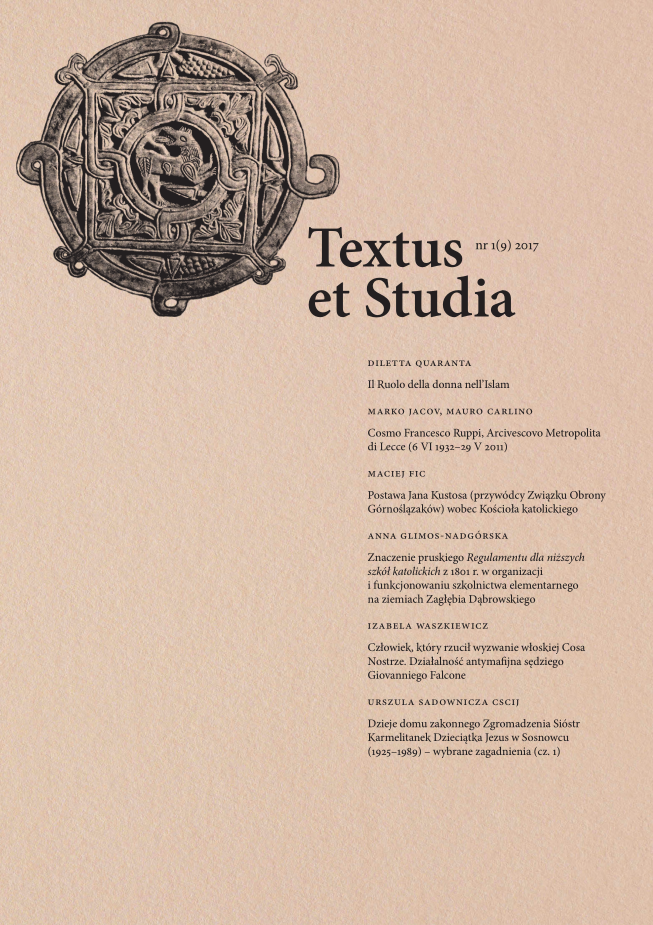Il Ruolo della donna nell’Islam
DOI:
https://doi.org/10.15633/tes.03101Słowa kluczowe:
islam, kobieta, Koran, prawo, szariat, Mahomet, zwyczaj, małżeństwo, dziedziczenie, tolerancja, hidżabAbstrakt
The problem of a woman’s role in an Islamic world evokes today a lot of emotions in the context, on one hand, of bigger and bigger sensibility of the world on the equality of rights of sex, and on the other wider presence of Muslim communities in cultures which are traditionally strange or directly reluctant to Islam.
The author stipulates that her article is not an attempt of judging a woman’s position in an Islamic world, but only a presentation how a woman’s role in shown by the Quran and Islamic traditions in the womb of Muslim communities which have different tints dictated by legal or mental interpretations. Contemporary legislation of Islamic states has a fundamental place in the article.
A figure of a woman appears in the text of Quran very often, even more often than in the Bible. However, a woman in the Quran appears rather as an impersonal form, without any specific name, and rather as an area of certain rules used towards her. A special exception is Blessed virgin, the Mother of Jesus whose name is repeated in the Quran more often than in Gospels. Muhammad appreciated a woman’s value when he took her situation into consideration in times contemporary to him. He gave her what she did not have in that tribal culture of Arabic people e.g. equality in nature to a man, right to succeed, recognition of birth of a daughter as God’s blessing.
However, taking into consideration appropriate texts of the Quran showing a woman as a creature having her own dignity, created like a man by God, as well as texts of different traditions, or contemporary sharias, one thing cannot be given to a woman – the equality of rights.
It is visible in many facts presented in the article, for example: religious admissibility, legal polygamy and its actual existence, practically a woman cannot take the first step to divorce, a woman cannot marry a non-Muslim, factual “belonging” of children to a father, and not to a father and mother, different levels of impossibility of gaining education depending on local legislation or customs, inequality in inheritance with relation to a man, value of a woman not as an independent subject, but only in relations to a figure of a man whose a daughter, a wife, a sister she is. The author of the article indicates, that although a woman cannot in practice even dream of things which are naturally vested to a man, she has an actual influence on a family life, society or even all state organisms. A woman’s situation changes depending on a country, interpretation of Koranic texts coming from the Quran and many other influences which take place in contemporary Islamic states. However, folk traditions have an important influence on a woman’s situation, if not dominant, but also mentality, usually strong human’s convictions which do not always go in harmony with current legislation of a given Muslim country.
Thereby, the article analyses a woman’s situation in individual countries and explains the main nature of the greatest problems which appear in non-Muslim countries in which a Muslim woman tries to live. It is connected with a loudly discussed issue of putting hijab on, circumcision of women and other problems.
Finally, the problem of Islamic feminism appears together with famous figures of women as well as attempts of introducing something like women’s right in Islamic countries as for example in Morocco. The article tries in a scientifically honest way to show the figure of the woman in the Islamic world, and also debunk many stereotypes and for this reason the article appears to be precious for a non-Muslim reader.
Pobrania
Opublikowane
Numer
Dział
Licencja
Prawa autorskie (c) 2018 Diletta Quaranta

Praca jest udostępniana na licencji Creative Commons Attribution-NonCommercial-NoDerivatives 3.0 Unported License.
Twórca oświadcza, że przysługują mu prawa autorskie do utworu i że nie są ograniczone w zakresie objętym niniejszym oświadczeniem oraz że utwór jest dziełem oryginalnym i nie narusza praw autorskich innych osób.
Twórca zezwala Uniwersytetowi Papieskiemu Jana Pawła II w Krakowie na nieodpłatne, niewyłączne i nieograniczone w czasie korzystanie z utworu, to jest:
- utrwalanie i zwielokrotnianie: wytwarzanie egzemplarzy utworu techniką drukarską, reprograficzną, zapisu magnetycznego oraz techniką cyfrową;
- obrotu oryginałem albo egzemplarzami, na których utwór utrwalono (wprowadzanie do obrotu, użyczenie lub najem oryginału albo egzemplarzy, publiczne wystawienie, wyświetlenie, a także publiczne udostępnianie utworu w taki sposób, aby każdy mógł mieć do niego dostęp w miejscu i w czasie przez siebie wybranym);
- włączenie utworu w skład utworu zbiorowego;
- udzielanie przez Uniwersytet Papieski Jana Pawła II w Krakowie sublicencji Creative Commons Uznanie autorstwa 4.0 Międzynarodowe (CC BY 4.0)
Uniwersytet Papieski Jana Pawła II w Krakowie udostępnia utwór na Platformie Czasopism należącej do uczelni, na licencji Creative Commons Uznanie autorstwa 4.0 Międzynarodowe (CC BY 4.0). Tym samym uprawnia wszystkich zainteresowanych do korzystania z utworu pod następującymi warunkami:
- zostanie podany autor i tytuł utworu,
- zostanie podane miejsce publikacji (tytuł czasopisma i identyfikator DOI oryginalnie opublikowanego utworu).

